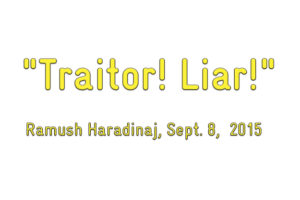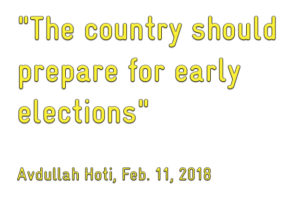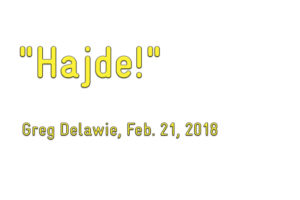Two and a half years after Kosovo and Montenegro signed an agreement to demarcate their shared border, Kosovo’s Assembly has today (Wednesday, March 21) ratified the deal.
With a two-thirds majority (80 votes) needed to pass the deal, deputies voted by a margin of exactly 80 votes for to 11 votes against. The ratification passed with an annex from president of Kosovo Hashim Thaçi and Montenegro’s president Filip Vujanović, pledging to review the deal in the case that errors are found.
Today’s Assembly session was the sixth attempt to ratify the deal in recent weeks, as the extraordinary session has been repeatedly postponed due to the government not having the support to proceed.
In February, opposition party LDK had agreed to vote in favor of the law ratifying the agreement, after the wording was amended to show that a report attached to the law was merely guidance and not legally binding. The report in question was the 600-page ‘Bulliqi report’ drawn up by a second Commission on Border Demarcation that was established by Ramush Haradinaj’s government to review the findings of the original agreement — the Bulliqi commission asserted that the proposed border would see Kosovo losing land.
But even with the support of LDK, the government still didn’t have the numbers it needed, until a crucial tipping point in the government’s favor came last week when Donika Kadaj left opposition party Vetëvendosje and returned to her original party, AAK. With support seemingly confirmed, yesterday (March 20), deputies lined up to give speeches on the deal until after midnight, before the voting was ultimately postponed once again.
When the session resumed at 11 a.m. this morning (March 21), the Assembly was filled with tear gas as President of the Assembly Kadri Veseli announced the voting was due to begin, in scenes reminiscent of early protests at attempts to pass the demarcation bill in 2015. Three further tear gas disruptions followed — as well as the detention by police of seven Vetëvendosje deputies, and the banning of a further eight from the Assembly session — before the agreement was ultimately ratified.
With some sort of a line seemingly having been drawn under the whole saga — for now — K2.0 uses numbers and quotes to explore what all the fuss has been about.
 — Days since the border demarcation deal was signed with Montenegro in Vienna.
— Days since the border demarcation deal was signed with Montenegro in Vienna.
For two and a half years, demarcation has dominated the political discourse. The border deal with Montenegro saw demarcation becoming the most used word in daily vocabulary and the issue has consumed conversations within politics, in the media and in the wider public. It has divided deputies, opinion makers, regular citizens and even geography experts on where exactly the line runs.
With political interactions polarized and in a state of stand-off over the issue — ultimately leading to the early elections in June last year — it has at times virtually driven the legislative agenda to a standstill. In fact, as the issue rumbled on, only five laws passed the Assembly in 2017.
In the meantime, vital issues related to daily existence have been swept under the carpet.
Legislation on health insurance, which aims to regulate equal access to health services, still hasn’t entered into force, while all Kosovars still struggle with a poor health system. Official statistics suggest that the unemployment rate is frozen at around 30 percent — with youth unemployment at 50 percent — but the issue has only been vocally raised during the 2017 elections campaigns, and was quickly ditched again subsequently.
Similarly, the re-integration of thousands deported from EU countries, following the en masse 2015 emigration of Kosovars looking for a better life, has barely received any attention, nor other social issues, which have been equally overlooked by the institutions and the media.

AAK leader Ramush Haradinaj has previously been one of the most outspoken opponents of the border agreement, famously accusing the then head of the Commission for Border Demarcation with Montenegro, Murat Meha, of betraying his country.
Eighteen months after he stormed into a Commission meeting, throwing maps and insults and insisting that they had got their geography wrong, Haradinaj is now head of the government pushing the very same deal through the Assembly.
Coming from the affected Dukagjini region, Haradinaj supported all opposition action against the deal, including activating tear gas canisters in the Assembly. Frustrated with the whole situation, he even resigned from his position as an Assembly deputy in February 2016.
Upon being elected prime minister however, Haradinaj has had to do his best to make it look as though he hasn’t been performing a massive U-turn, while simultaneously reversing his stance 180 degrees. In order to do this, upon being sworn in as prime minister, in the first meeting of the government he immediately established the new commission — headed by Shpejtim Bulliqi — to review the original commission’s decisions; this reported back on Dec. 4, saying that the 2015 agreement violates Kosovo’s territory.
Haradinaj can now also point to the ‘annex agreement’ signed by President Hashim Thaci and Montenegrin President Filip Vujanovic as evidence that he hasn’t completely abandoned his principles on the issue. While the annex is not legally binding, it expresses the willingness of both parties to review the agreement in the future, if errors are found.
 — Days since the European Commission conditioned visa liberalisation for Kosovo with signing of the border demarcation agreement.
— Days since the European Commission conditioned visa liberalisation for Kosovo with signing of the border demarcation agreement.
The requirement of ratifying the border demarcation agreement was a very late condition for Kosovars being able to travel visa-free, added by the EU in 2016. It was never part of the visa free roadmap that was issued in 2012, when the EU started initial talks with Kosovo on visa liberalization.
Each year, reports from the European Commission suggested that fighting corruption was the main obstacle to abolishing the visa regime for Kosovars, and asserted that tackling it was a key requirement that would pave the way to visa liberalization. When they issued a recommendation on May 4, 2016 that the visa regime be lifted, but only after the track record on fighting organized crime had been strengthened and the border demarcation agreement ratified, many perceived it as double standards from the EU, pointing to border disputes between other countries that had been overlooked when granting their citizens visa-free travel.
Since the requirement was made, the EU has continuously emphasized that the agreement on demarcation needs to be ratified, saying that there is no evidence that proves a loss of territory. In this time, the agreement has been largely held up as an absolute condition for visa liberalization by both EU voices on one side and local politicians on the other, rarely remembering to mention that corruption is also one of the visa liberalization conditions.
Some opposition deputies have belatedly raised this issue as part of attempts to dismiss accusations that their lack of support for the agreement has been preventing Kosovars from traveling freely.
 — Deputies sentenced for throwing tear gas in the Kosovo Assembly.
— Deputies sentenced for throwing tear gas in the Kosovo Assembly.
Vetevendosje’s deputies Albin Kurti, Albulena Haxhiu, Faton Topalli and Donika Kadaj (before her return to AAK) were all given suspended prison sentences in January for their role in protests against the demarcation deal; one year and six months for Kurti and Kadaj, one year and three months for Haxhiu, and one year and two months for Topalli. All the deputies have appealed the decision.
The initial verdict by the Basic Court of Prishtina came after a long saga, which included the Assembly hall regularly being filled with whistles and tear gas during 2015 and 2016, arrest warrants for Vetevendosje deputies, followed with a ‘Catch me if you can’ game with Kurti and the police as the protagonists.
The unusual methods of protest by Vetëvendosje — which for some time was also in informal partnership with then fellow opposition parties AAK and Nisma — came as an attempt to block ratification of demarcation, along with the Brussels agreement on the creation of an Association of Serb Majority Municipalities.
During the political stand-off at the Assembly, the streets of the capital saw the biggest protests since independence — called for by Vetëvendosje. Government cars were set alight, windows in the offices of both PDK and the police were smashed, and there were many clashes between police and protesters.
The Assembly tear gas scenes returned four times on March 21, in the final hours before the deal finally passed; seven further Vetëvendosje deputies — Xhelal Svecla, Fitore Pacolli, Salih Zyba, Drita Millaku, Liburn Aliu, Arbërie Nagavci and Valon Ramadani — were subsequently detained by police.
 — Death amidst the whole demarcation debate.
— Death amidst the whole demarcation debate.
Astrit Dehari, a Vetevendosje activist, died at Prizren Detention Center in November 2016. The autopsy results stated that his death was a suicide by asphyxiation, but the circumstances surrounding Dehari’s death and the aftermath have a caused a lot of controversy, with Vetevendosje still demanding justice for Dehari and alluding that his death hasn’t been investigated properly.
Dehari was one of the six Vetevendosje activists arrested in August 2016, in relation to an attack on Kosovo’s government building earlier that month, which prosecutors linked to Vetevendosje’s opposition to the demarcation deal. He had been held, without charge, on suspicion of terrorism for 68 days.
While charges were dropped for one of the activists, in November 2017 the Basic Court of Prishtina found the other four guilty and jailed them for a total of 21 years and six months; Assembly deputy Frasher Krasniqi received eight years, Atdhe Arifi six years, Egzon Haliti five years and six months and Adea Batusha for two years. With the exception of Batusha, whose sentence was suspended, the activists remained in custody until Monday (Feb. 26), when they were released on house arrest. The following day it was announced that the case would be re-trialled.

LDK’s parliamentary leader, Avdullah Hoti, has led calls for early elections over the issue of border demarcation in recent weeks, blaming the current government partners for having delayed the agreement’s ratification for years. LDK insists that there should be political accountability for the delays and the resultant damage that it says has been caused to the country.
The party’s call for new elections is linked to the fact that a government headed by its leader, Isa Mustafa, was brought down in May 2017, in large part due to the lack of ratification of the border demarcation deal. That very same deal has now been approved — albeit with the ‘annex agreement.’
LDK had constantly insisted that the deal signed with Montenegro in 2015 does not violate Kosovo’s territory, and previously refused to vote for the agreement while the Bulliqi report — which says the opposite — was attached to it.

U.S. Ambassador, Greg Delawie, has divided opinion over his ‘encouragement’ for the border demarcation deal. The agreement’s proponents have pointed to the U.S.’s support as validation that it must be signed, while its opponents view Ambassador Delawie’s regular interventions as out of place and patronizing.
One way or another, the U.S. does seem heavily invested in the issue. Back in 2015, the U.S. State Department got involved in scrutinizing the maps, before concluding that the proposed border “closely aligns” with historical records and offering a reminder that concluding the agreement “represents an important step in Kosovo’s path toward European integration.”
As the months and years have stretched on, such relatively subtle language has been replaced with more urgent tones. On the evening before the deal was first scheduled to have been voted on last month, Delawie took to Twitter to once again leave deputies in no doubt where the U.S. stands on the issue. “Citizens have waited too long for visa liberalization — it’s time to ratify the demarcation agreement. Hajde!”
Delawie and other foreign ambassadors have also regularly been present in the Assembly when the issue of demarcation has been on the table, holding meetings with deputies in an attempt to sway their votes. Last night the U.S. Ambassador was once again closely following developments, tweeting from the Assembly: “Do not leave your citizens in isolation. Vote for #Kosovo’s future. Vote in favor of this agreement.”
In a series of statements today between the Assembly’s attempts to vote on the agreement, Delawie once again left no one in any doubt as to where his support lay. “I would urge MPs to vote yes on the Border Demarcation Agreement. I encourage them to vote yes for Europe. I encourage them to vote yes for progress for #Kosovo. This issue has tied things up for too long now. It is time for Kosovo to move forward,” he tweeted before stating the following to reporters at the Assembly: “I will not give up, I hope that deputies will not give up.”K
Feature image: Majlinda Hoxha / K2.0.



